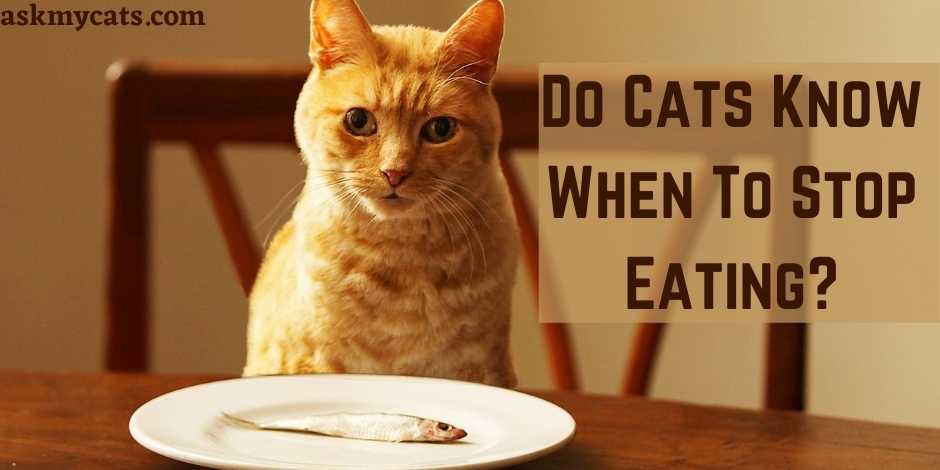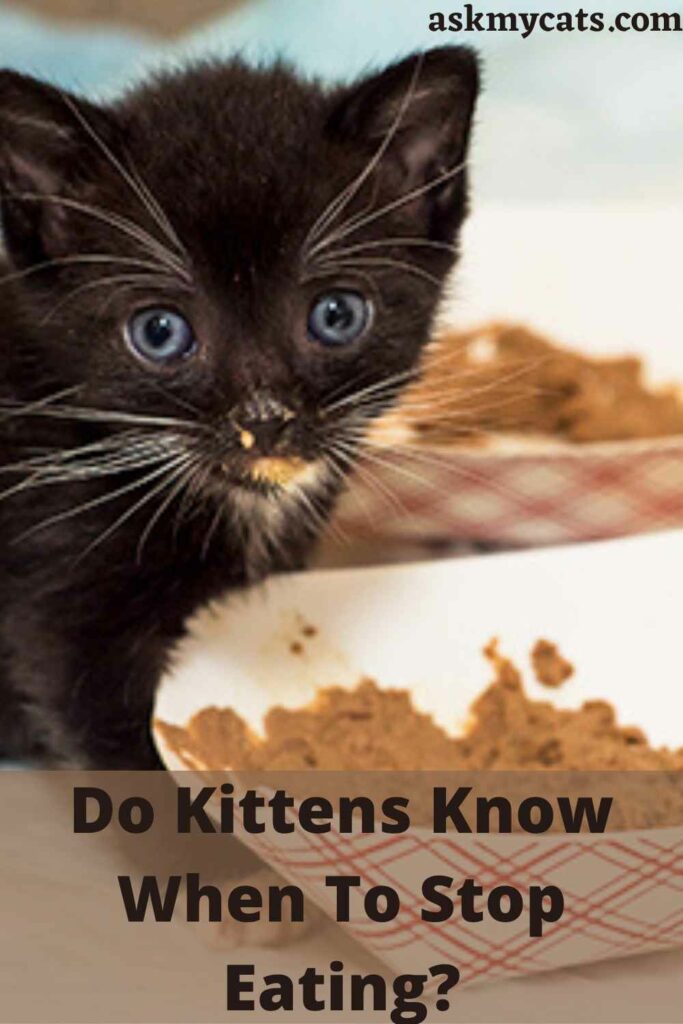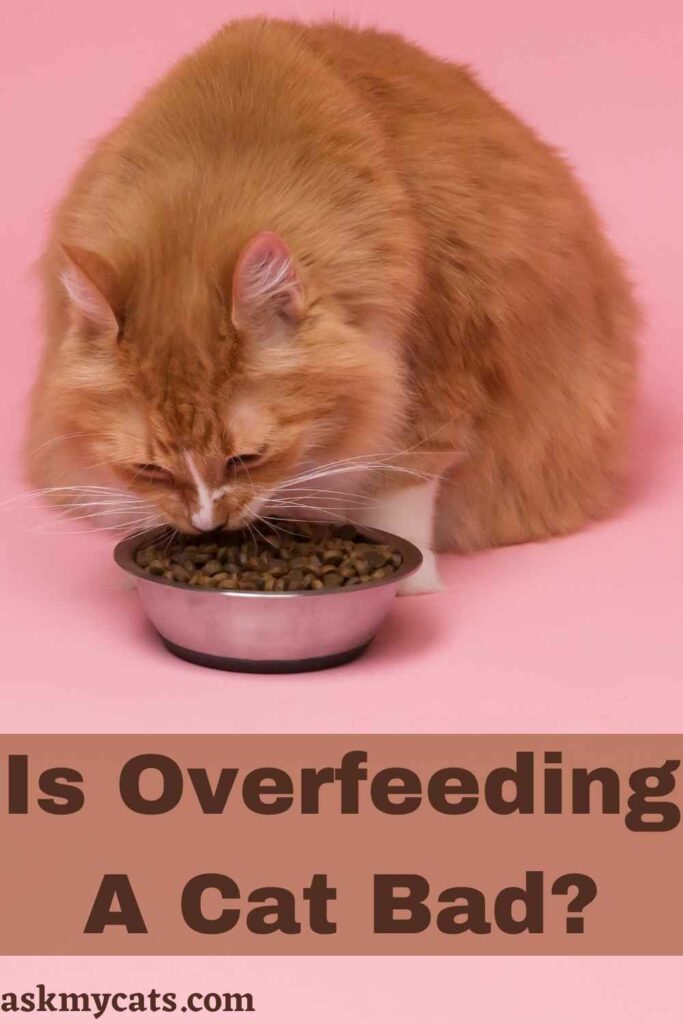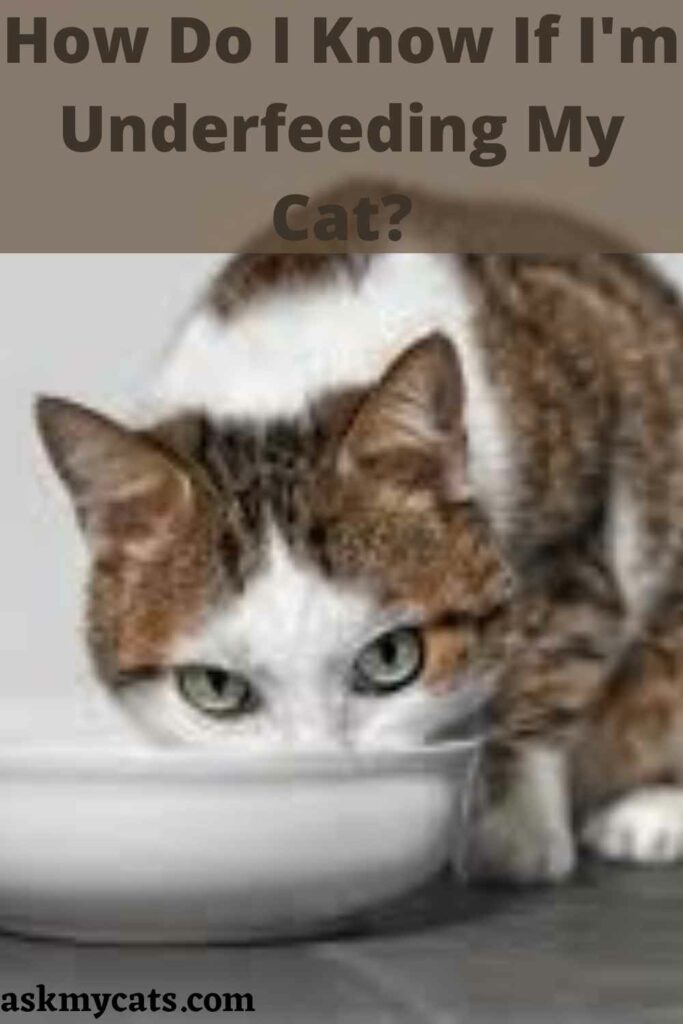When your cat is hungry, it will act in a predictable manner around mealtime, and many cats can be quite demanding. However, because cats aren’t as food motivated as dogs, acting hungry all of the time, begging, or whining for food in between feedings could indicate a medical problem.
Understanding how and when cats become hungry can help you determine when and what to report to your veterinarian.
So, do cats know when to stop eating?
Yes, most cats know to stop eating once they are full. They will not eat the food just because it’s there.
This article will inform you about the eating habits of cats and how you can control them.


Give Your Cat the Perfect Day
Get the Free Ebook!
Do Kittens Know When To Stop Eating?
No, kittens don’t know when to stop eating and can easily overheat if left to make their own decisions.

Kittens will frequently seek out their mother to nurse them, but what about solid food?
Yes, kittens will reach a point in their life when they must switch to solid food.
After the baby reaches the age of four weeks, they may be able to transfer from nursing to eating.
With this in mind, you might ask if kittens can tell when it’s time to quit feeding.
Kittens don’t know when to stop eating and can quickly overheat if left to their own devices.
You should limit their portions, or they risk gaining a lot of weight in a short period of time.
Because the mother can only offer so much food to the litter in the wild, a lot of the quantities are naturally limited.
However, with an indoor kitten, this alters because you can offer a large amount of cat food at once if necessary.
Key factors include:
- Portion Control
- Type of Food
- Age of the Kitten
It’s a good idea to go over everything with the young cat and set up some portion control. This will guarantee that the kitten eats properly and does not wind up in a position where it continues to gain weight rapidly.
Most kittens do not require much food to flourish. Therefore anything more is superfluous. Start with regular servings and work your way up.
Must Read: How Long Can A Cat Go Without Eating?
How Do I Know If My Cat Is Eating Enough?
If you want to know whether your cat is eating enough or not, you can use a formula made by an animal medical center in New York. A healthy, active 8-pound adult cat requires about 30 calories per pound per day.
It’s a popular question among new cat owners, and there are ways to ensure your feline pal gets the nutrition they need.
Cats, unlike dogs, can be picky about their food and will often refuse to eat it if they don’t like it, even if they are hungry.
This is why it’s crucial to establish a balance between your cat’s nutritional requirements and their tastes. Because, regardless of what their humans believe, the cats are in charge.
When you take your cat in for its first checkup, the first thing you should do is ask your veterinarian how much food your cat needs.
Adult cats require different types of food, as well as different amounts of food, than kittens. Furthermore, feeding a nutrient-dense kitten food to an adult cat could result in Fluffy getting overweight.
Furthermore, because cats are less prone to drink water than their canine counterparts, it’s a good idea to serve your cat both wet and dry food.
You should also offer your cat a high-protein diet and make sure it’s specifically developed for cats, as felines have different nutritional requirements than other household animals such as dogs.
When it comes to determining how much food to feed your cat, there is a formula you may apply. “A healthy, active 8-pound adult cat requires around 30 calories per pound per day, according to the Animal Medical Center in New York. As a result, an 8-pound cat needs roughly 240 calories per day, “Experts advised.
If you’re following all of the requirements and still worried that Fluffy isn’t receiving enough calories, Experts suggest looking at your cat’s back.
Take your kitty to the vet if you can see the cat’s backbones or ribs through its coat. It may be as simple as altering your cat’s diet to solve the problem.
It’s possible that if the food is too rich for your cat, it’ll end up in the litter box. Stick to your feeding regimen, portion size, and brand after you’ve found one that works for you and Fluffy. Because cats, like their digestive systems, do not appreciate change.
Interesting Read: Why Do Cats Purr While Eating?
Can Cats Control Their Eating?
Although most cats can control their eating, it is totally dependent on the personality of the cat.
Meal feeding refers to feeding your cat exclusively at specified times throughout the day. This method can be used to feed both canned and dry foods.
The advantage of meal feeding is that food intake may be closely monitored, so you’ll be able to see whether your cat’s appetite has changed.
Furthermore, suppose you have the pleasure of having multiple cats. In that case, all of them will have access to food without one of them being dominant over the others — one cat could be eating all of the food and gaining too much weight, while the other cat(s) could be missing out on the nutrients they require to stay healthy.
There are certain disadvantages. Between meals, cats may beg for food. Your cat is unable to control the amount of food she consumes at any given time.
You may rest assured that she is getting the right quantity of food and nutrients if you follow your veterinarian’s recommendations for proper amounts and regular feeding.
Should I Let My Cat Eat As Much As He Wants?
No, you should never let your cat eat as much as he wants, as this could result in overeating and several health conditions.
Free feeding cats can lead to obesity and overeating, particularly if the amount of food available is not controlled. It’s also tough to discern if your cat’s appetite has improved or worse. It’s also tough to tell how much each cat is eating if you have numerous cats.
Despite what your cat is trying to tell you if your cat is whining for food and gaining weight, this is an indication that you should feed it less.
Some cats, like some people, have a strong desire for food, and the more you provide them, the more likely they are to become overweight and vulnerable to a variety of medical problems.
Obese pets are more likely to develop diabetes, joint problems, cancer, and other diseases. 3 Most cats only need 1/4 to 1/2 cup of dry kibble each day.
However, this varies based on your cat’s activity level and the number of calories in your cat’s food.
Is Overfeeding A Cat Bad?
Yes, overfeeding a cat is bad as it can lead to a variety of health complications like obesity and diabetes.

Cats, like us, require a well-balanced diet. Overfeeding your cat can result in obesity, which raises the risk of certain feline health problems.
Choosing the appropriate food for your cat can be difficult because so many different types and brands of wet and dry food are available.
It’s crucial to remember that an unhappy cat is an obese cat, and overweight cats will have a hard time participating in daily activities.
Overfeeding a cat can lead to: –
1. Multiple Health Issues
While your cat’s diet can be adjusted, health problems caused by overfeeding can persist long after the diet has been adjusted.
Obese cats have been shown to have issues such as joint pain, breathing difficulty, arthritis, diabetes, liver, and tooth problems.
The sooner you can feed your cat the right amount of food, the less likely they are to develop these issues.
2. Lack Of Exercise
Cats enjoy running, jumping, and playing! This usually happens in the middle of the night or in between cat naps. Scratching on posts, playing with toy mice, jumping on furniture, and running through hallways are all activities that healthy cats like.
Cats benefit from this form of activity because it keeps them in shape and helps them retain their physical strength.
Obese cats struggle to perform many of these activities, resulting in a lack of activity that can exacerbate feline health problems.
3. Costly
Overfeeding your cat means you’ll use up a lot more cat food, which can be expensive. Furthermore, vet fees for obesity-related health conditions can be significantly more expensive than the cost of regular cat food.
Monitor your cat’s food consumption to avoid unnecessary trips to the veterinarian and costly costs.
4. Grooming Habits Suffer
Overweight cats may appear drowsy, which can influence their grooming. Cats groom themselves to keep their coats lustrous and silky, and overweight cats have been known to stop grooming totally.
Because of their big size, they have a difficult time moving around and keeping clean, and their coat may deteriorate as a result.
Matting, or clumping of hair, can happen when your cat’s hair becomes tangled, creating discomfort. A lack of care may result in heavy dandruff, painful matting, and poor coat condition.
How Do I Know If I’m Underfeeding My Cat?
One sign by which you can know if you are underfeeding your cat is her losing weight despite of eating and not having any underlying medical issues.

Cats prefer to consume multiple tiny meals throughout the day. The amount of food a cat requires is determined by its age, food type, body weight, and level of activity.
A cat that consumes more food than it needs may grow overweight and may suffer as a result.
Your cat will lose weight and become unwell if you underfeed it. Adult cats should have a healthy body weight that is neither too skinny nor too fat.
A veterinarian can help you determine your cat’s ideal weight.
Many cats will refuse to eat if their food is placed too close to their toilet site or something that scares them.
You may determine your cat’s weight by lightly feeling its ribs; if they are difficult to locate, your cat may be overweight.
If your cat’s ribs and backbone are visible, they may be underweight and sick. Consult a veterinarian or a pet care specialist if you’re unsure to see if your cat is within its proper weight range.
Signs your cat is underweight
- ribs can be seen on shorthaired cats
- no fat can be felt – where present the skin pouch underneath the belly is empty, that is, skin on skin
- tummy looks empty due to a lack of fat
- spine and hip bones can be seen – your cat looks like a size zero model
- a small amount of muscle over the back and hips, upper legs feel stringy skull bone very obvious when stroking the head – cat feels bony when stroked
Frequently Asked Questions
Is my cat not eating because of recent vaccination?
Yes, it is possible that your cat may not be eating because of the recent vaccination provided to her. Your cat’s refusal to eat could be due to an allergic reaction to the vaccinations. Vaccines have saved the lives of millions of animals, yet they do have negative effects on some of them. The most prevalent of these adverse effects, which are usually short and moderate, is loss of appetite.
Can change in surrounding effects a cat’s eating habits?
Many cats, like many people, are creatures of habit. As a result, a change in routine can cause a decrease in appetite. Additionally, whether traveling by automobile or plane, some animals experience motion sickness, which can cause nausea and a refusal to eat.
Why is my cat losing weight even though it is eating?
Your cat might be losing weight even though it is eating because of Hyperthyroidism. Cats with an overactive thyroid gland have hyperthyroidism, and it makes them always feel hungry. Simple blood tests done by your vet can diagnose a cat with this illness. It can be treated with medication.
Final Words
Most cats simply enjoy eating, and their days revolve around naps and meals. Your cat is most likely a food-motivated feline as long as its weight is stable, it isn’t vomiting or having diarrhea, and it isn’t acting strangely.
If you have any unanswered questions, feel free to ask us in the comments section.
Also, check out Why Is My Nursing Cat Always Hungry?
